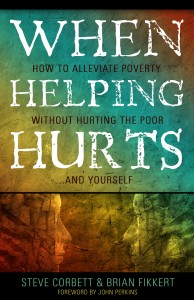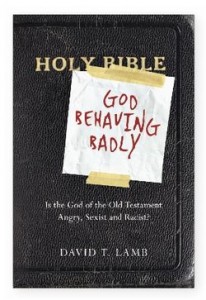Notes on two books I’ve read recently:
When Helping Hurts:
Alleviating Poverty Without Hurting the Poor. . .and Yourself
 Steve Corbett & Brian Fikkert
Steve Corbett & Brian Fikkert
Moody, 2009
My Rating: *****
I have a love-hate relationship with books like this. On the one hand, I love when a book causes me to think hard, reevaluate my assumptions, and implement a more thoughtful plan of action. On the other hand, I cringe at the idea that my good intentions in the past may have led to misguided actions and harmful results.
When Helping Hurts is written by two men who want to see benevolence ministries, disaster relief, and community building done well. They want to see suffering alleviated, but not in a way that leads only to the activist feeling good, or the beneficiary receiving a temporary fix. Poverty is complex, which is why the best solutions are never the simplest. Furthermore, taking into account human sinfulness, Corbett and Fikkert remind us that we are all broken. Everyone – poor and rich alike – needs to be fixed.
One of the biggest problems in many poverty-alleviation efforts is that their design and implementation exacerbates the poverty of being of the economically rich – their god-complexes – and the poverty of being of the economically poor – their feelings of inferiority and shame. (65)
In the margin, I jotted down an “Ouch!” beside that sentence. And that’s just one of many “ouches” I felt while reading this book.
Thankfully, the authors don’t merely point out what is hurtful in the way we go about “helping.” The book spends much more time dealing with the subtitle: How to alleviate poverty without hurting the poor… and yourself. That’s why When Helping Hurts is the most practical and informative books on social assistance that I’ve come across. I wish this book had been available before I moved to Romania. Many of my efforts at poverty alleviation were good. Many were ultimately unhelpful. Regardless, When Helping Hurts will greatly influence the way I think about and engage in social assistance and relief work in the future.
God Behaving Badly:
Is the God of the Old Testament Angry, Sexist and Racist?
 David T. Lamb
David T. Lamb
IVP, 2011
My Rating: *** 1/2
David Lamb’s book begins like this:
“How does one reconcile the loving God of the Old Testament with the harsh God of the New Testament?”
Yes, you read that right. Lamb starts off by turning the traditional apologetic upside down. He contrasts the benevolent heart of the Old Testament God with Jesus’ warnings about hell. God Behaving Badly intends to show that, far from being a distant, capricious deity, the God we see in the Old Testament is fascinating, relational, and – above all – good.
So is God angry or not? Lamb engages in apologetics by redefining the terms. Going to the most difficult passages (like the Canaanite Conquest or the smiting of Uzzah), Lamb shows that anger and love are not mutually exclusive.
Unfortunately, Lamb’s chapter on sexism is disappointing. His method is to show that within the Old Testament context, God’s laws were actually progressive. The problem with this view, of course, is that “progressive” is an oft-used word that seems based on an idea outside of the biblical witness. Progression from what? Toward what? 21st century views on gender? To top it off, there are a couple of unnecessary quips to ruffle complementarian feathers: “If it is okay for women to compose sections of the Bible, perhaps we should let them teach it?” (64). I was disheartened to see Lamb basically equate a complementarian view of gender roles as “sexist,” and then blame the historical church for not being as progressive as he believes the Bible is.
All in all, caveats remaining, God Behaving Badly offers helpful insights into one’s study of the Old Testament. Most of this book is a helpful primer on problem passages in the Bible and how to interpret them according to their canonical context. My differences aside, I sensed in my reading how much Lamb loves the Old Testament, especially the God we see described there.


















